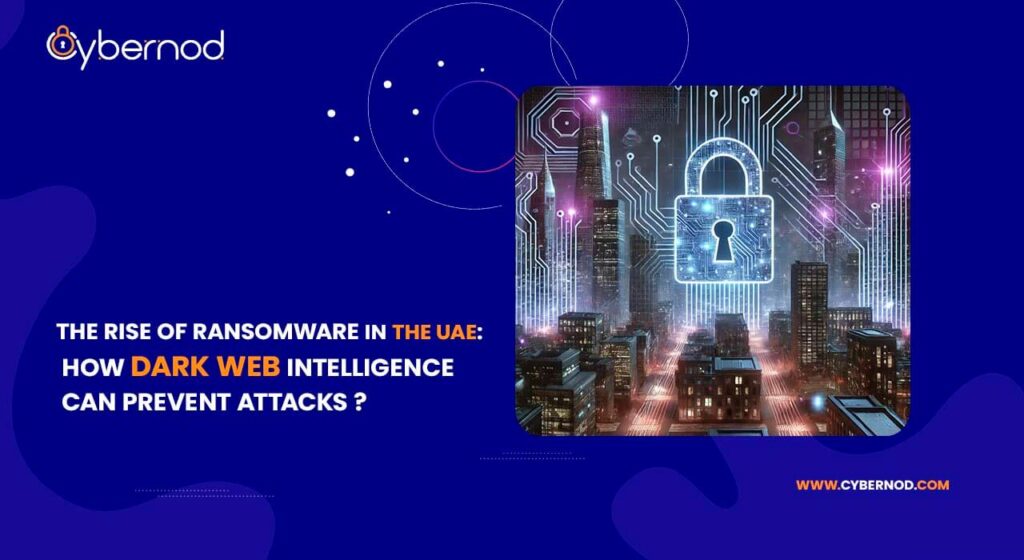
The rise of ransomware attacks has become a significant concern for businesses in the UAE, with small and medium-sized enterprises (SMEs) particularly vulnerable. As cybercriminals adopt more sophisticated methods, SMEs often lack the robust cybersecurity defenses that larger organizations have in place, making them prime targets. According to a 2023 report by the UAE Cyber Security Council, ransomware incidents have surged by 34% over the past two years, with SMEs accounting for more than half of these attacks. This growing threat not only disrupts operations but also imposes severe financial burdens, as victims are often forced to pay substantial ransoms to regain access to their systems and data.
Dark web intelligence has emerged as an essential tool in combating these threats. Cybercriminals frequently use the dark web to buy, sell, and exchange ransomware kits, stolen data, and compromised credentials, all of which facilitate further attacks. By monitoring dark web activities, businesses can gain early warnings of potential threats, identify vulnerabilities, and take proactive measures to prevent attacks before they occur. In a landscape where cyber threats continue to evolve, dark web intelligence provides a crucial layer of defense, helping SMEs in the UAE stay ahead of ransomware attacks and protect their critical assets.
Understanding Ransomware
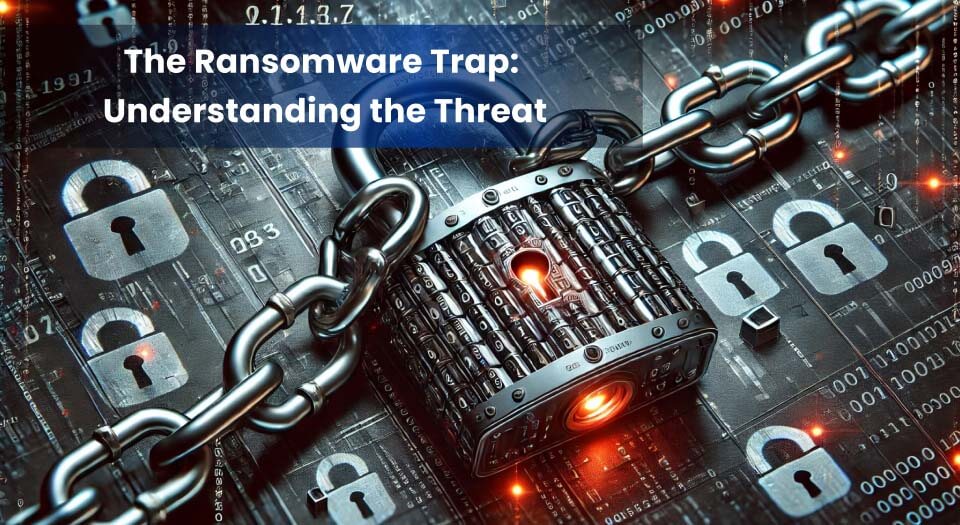
Ransomware is a form of harmful software that encrypts a victim’s data, making it inaccessible until a ransom is demanded. The attacker typically delivers ransomware through phishing emails, compromised websites, or exploiting security gaps in a company’s network. Once inside the system, the malware spreads rapidly, locking critical files and data behind unbreakable encryption. Victims are then presented with a demand for payment, often in cryptocurrency, in exchange for the decryption key.
Ransomware attackers employ various tactics to maximize their impact. One common method is phishing, where employees are tricked into clicking on malicious links or downloading infected attachments. Another tactic is exploiting vulnerabilities in outdated software, which allows attackers to gain unauthorized access to business networks. Double extortion has also emerged as a favored technique, where attackers not only encrypt data but also threaten to release it publicly unless the ransom is paid. This method compounds the consequences, creating a dual threat of operational disruption and data breaches.
The impact of ransomware attacks on businesses can be highly destructive. For small and medium-sized enterprises (SMEs), the financial loss from ransom payments and recovery efforts can be crippling. Beyond the monetary impact, ransomware often leads to severe operational downtime, preventing businesses from delivering services or accessing vital data. According to a report by cybersecurity firm Sophos, the average cost to recover from a ransomware attack in 2023 was over $1.4 million, a figure that includes ransom payments, data recovery, and lost business. SMEs, which often lack the financial and technical resources to mount a strong defense, are disproportionately affected.
In this context, conducting a thorough cybersecurity risk assessment and implementing robust cybersecurity solutions for small businesses are critical steps in preventing ransomware attacks. A proactive approach, including regular security gap analyses, helps businesses identify vulnerabilities before they are exploited.
The Role of the Dark Web in Ransomware Attacks

The dark web plays a crucial role in the proliferation of ransomware attacks, serving as a marketplace where cybercriminals can distribute malware, trade stolen data, and identify potential victims. Hidden from standard search engines, the dark web provides anonymity, enabling attackers to evade detection by law enforcement and cybersecurity experts. Ransomware operators use this underground network to share ransomware kits, offer hacking services, and sell sensitive information obtained from successful attacks. For small and medium-sized businesses (SMEs), this poses a significant threat, as stolen credentials and company data can be easily traded or auctioned, fueling further attacks.
One of the most concerning developments is the rise of Ransomware-as-a-Service (RaaS) platforms on the dark web. These platforms allow even low-skilled attackers to carry out highly sophisticated ransomware attacks by purchasing pre-packaged malware. RaaS providers offer user-friendly interfaces, making it easy for criminals to launch attacks with minimal technical knowledge. This model has contributed to a surge in ransomware incidents globally, as it lowers the entry barrier for cybercriminals. According to a report by the cybersecurity firm Group-IB, RaaS platforms were responsible for over 60% of ransomware attacks in 2023, demonstrating the alarming ease with which such attacks can be executed.
Research shows a direct correlation between dark web activity and the rising frequency of ransomware incidents. Reports from the World Economic Forum highlight how dark web forums are increasingly being used to facilitate the ransomware ecosystem, linking buyers and sellers of malicious software. For businesses, particularly SMEs, a thorough cybersecurity risk assessment and ongoing monitoring of dark web activity can be critical in identifying and mitigating emerging threats, helping to prevent devastating ransomware attacks.
The Growing Impact of Ransomware on UAE Businesses
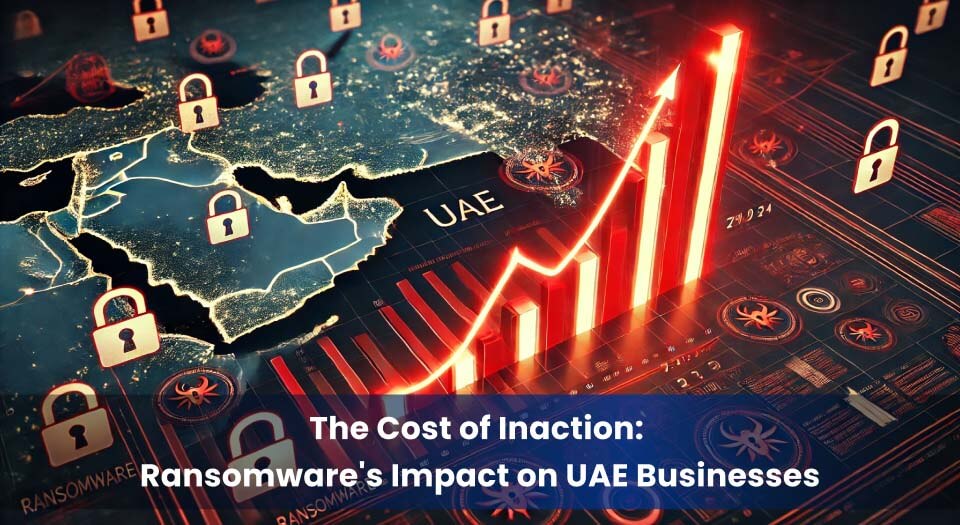
In recent years, ransomware attacks have had a profound impact on businesses across the UAE, with several high-profile incidents highlighting the growing threat. In one notable case, a major UAE-based energy firm fell victim to a ransomware attack that caused significant disruption to its operations, forcing the company to shut down critical systems for days. The financial repercussions were severe, with losses totaling millions of dirhams due to downtime and ransom payments. This attack not only crippled the firm’s day-to-day activities but also exposed sensitive client information, leading to lasting reputational damage. Similar incidents have been reported in the financial and healthcare sectors, where ransomware has exploited security gaps, severely impacting the affected companies.
One such example, documented by The National, involved a Dubai-based real estate company that experienced a crippling ransomware attack in 2022, which resulted in the loss of critical data and operational paralysis for several weeks. The attackers demanded a significant ransom, causing the firm to suffer both financially and operationally. The resulting public relations fallout further exacerbated the situation, eroding client trust and damaging the company’s reputation.
These examples underscore the necessity for businesses, particularly small and medium-sized enterprises, to take proactive measures to protect themselves. The costs associated with ransomware go beyond the immediate ransom payments; they extend to business interruption, loss of customer trust, and compliance issues. A comprehensive cybersecurity risk assessment, along with the implementation of cybersecurity services tailored for small businesses, can significantly reduce the likelihood of such attacks and their devastating consequences. Proactive defenses, including regular security gap analyses and dark web monitoring, are essential for mitigating the growing threat of ransomware in the UAE.
Dark Web Intelligence in Ransomware Prevention
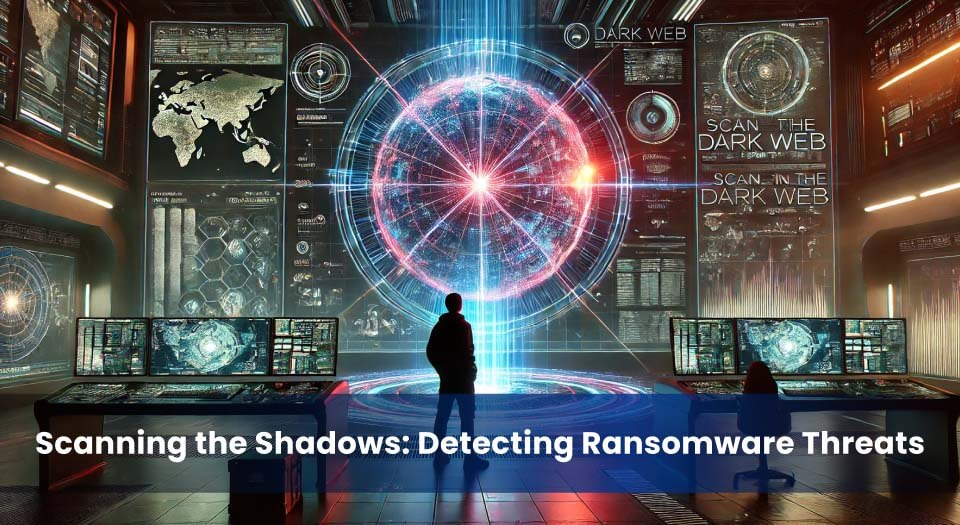
Dark web intelligence has become an indispensable tool in the fight against ransomware, offering businesses the ability to identify and mitigate potential threats before they strike. By monitoring dark web forums and marketplaces, cybersecurity teams can detect early warning signs of ransomware activity, such as the sale of compromised credentials, ransomware toolkits, or discussions about targeting specific industries or organizations. This proactive approach allows businesses to take defensive measures, patch vulnerabilities, and strengthen their cybersecurity posture before becoming a victim.
The process of monitoring the dark web involves scanning underground forums, black markets, and hacker communities where cybercriminals exchange stolen data and ransomware kits. Specialized cybersecurity firms offer services that continuously monitor these platforms for indicators of potential attacks. By identifying mentions of a company’s name, domain, or other sensitive information, dark web intelligence services can alert businesses to potential threats. Companies such as Recorded Future and Group-IB provide threat intelligence feeds that deliver real-time updates on emerging ransomware trends and vulnerabilities. These insights empower businesses, particularly small and medium-sized enterprises (SMEs), to stay ahead of attackers by implementing timely security updates and adjusting their defense strategies.
One of the key benefits of using threat intelligence feeds is the ability to stay informed about the latest tactics, techniques, and procedures (TTPs) used by ransomware operators. With ransomware-as-a-service (RaaS) becoming more prevalent, attackers are constantly refining their strategies, making it critical for businesses to be aware of these evolving threats. Threat intelligence not only highlights current ransomware trends but also offers actionable insights on how to prevent data breaches in small businesses and comply with cybersecurity regulations. For SMEs, regularly conducting cybersecurity risk assessments and integrating dark web intelligence services into their overall security strategy can provide a significant layer of protection against ransomware attacks.
By leveraging these advanced tools and services, businesses can significantly reduce their risk of falling victim to ransomware, safeguarding their operations, data, and reputation in an increasingly hostile cyber landscape.
Best Practices for Ransomware Prevention
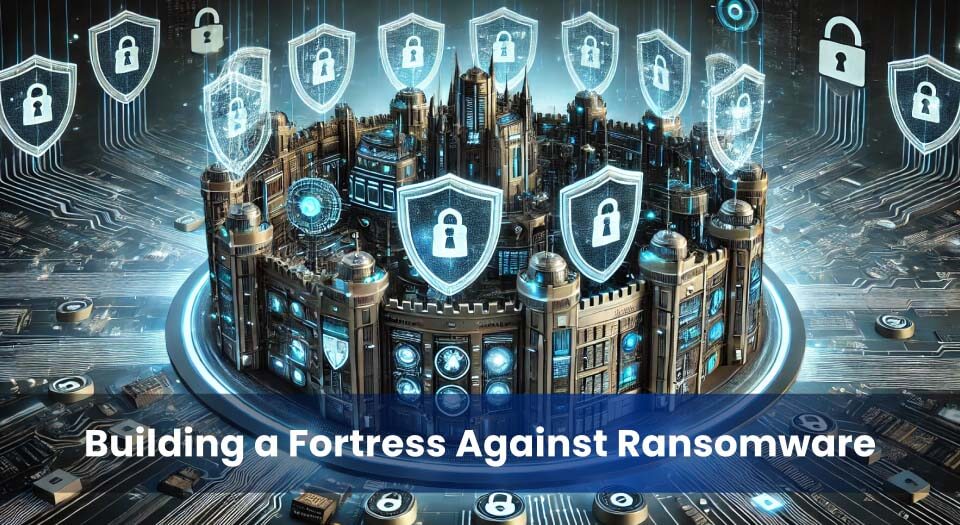
Implementing robust cybersecurity practices is essential for preventing ransomware attacks and mitigating the damage they can cause. One of the most critical steps is performing regular backups of all important data. By ensuring that backups are stored in secure, isolated environments, businesses can quickly restore their systems without paying ransoms. Additionally, organizations should adopt a comprehensive employee training and awareness program, educating staff about the dangers of phishing attacks and social engineering tactics, which are common methods of delivering ransomware.
Strong password policies are another essential element of ransomware prevention. Businesses should enforce the use of complex, unique passwords and require employees to change them regularly. To further protect against unauthorized access, multi-factor authentication (MFA) should be implemented across all sensitive systems. MFA adds an extra layer of security by requiring users to verify their identity through multiple methods, such as a password and a one-time code.
Network segmentation is also a key practice in defending against ransomware. By dividing the network into smaller, isolated segments, organizations can limit the spread of ransomware once a system is compromised. Coupled with effective patch management, which ensures that software vulnerabilities are quickly identified and addressed, businesses can reduce their exposure to potential attacks.
These best practices align with cybersecurity frameworks such as the National Institute of Standards and Technology (NIST) Cybersecurity Framework and guidelines from the Center for Internet Security (CIS). By incorporating these measures into their cybersecurity strategy, small and medium-sized businesses can significantly enhance their ability to prevent ransomware attacks, secure their data, and comply with cybersecurity regulations.
Cybersecurity Services and Solutions in the UAE

The UAE has become a hub for advanced cybersecurity services, with several providers offering specialized solutions aimed at preventing ransomware attacks. These companies deliver a broad range of services, including threat intelligence, incident response, and vulnerability assessments, all designed to fortify businesses against cyber threats. For small and medium-sized enterprises (SMEs), these services are critical in establishing robust cybersecurity frameworks that address ransomware risks.
Cybersecurity firms such as DarkMatter and Help AG are among the leading service providers in the UAE. DarkMatter offers a comprehensive suite of services, including threat intelligence and managed security services, which help businesses detect and mitigate ransomware threats early. Their incident response team is equipped to handle cyberattacks swiftly, minimizing downtime and financial losses. Help AG specializes in cybersecurity assessments and security gap analysis, providing detailed vulnerability assessments that allow businesses to strengthen weak points in their security infrastructure.
When comparing different solutions, key factors such as features, pricing, and target audience come into play. Larger organizations may prefer the extensive offerings of DarkMatter, which cater to complex environments with advanced ransomware prevention capabilities. In contrast, Help AG provides scalable services tailored to SMEs looking for the best cybersecurity solutions at more affordable pricing. Both companies emphasize compliance with cybersecurity regulations in the UAE, making their services attractive to businesses of all sizes.
Selecting the right provider depends on the specific needs of the business, whether that involves choosing the best cybersecurity solution for small businesses or ensuring compliance with local regulations. Regardless of the provider, leveraging these services enables businesses in the UAE to mitigate the top cybersecurity threats facing small businesses and prevent data breaches that could result from ransomware attacks.
Conducting a Security Gap Analysis
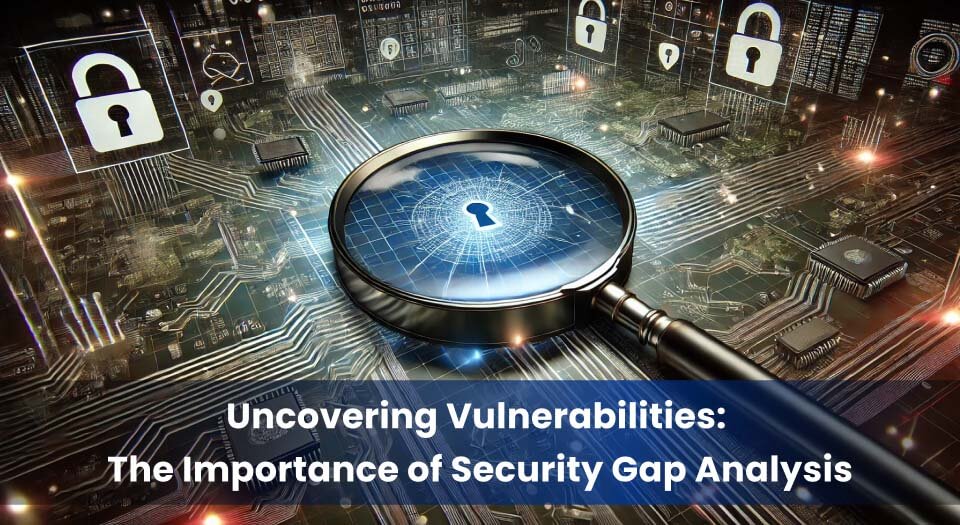
A security gap analysis is a critical process that helps businesses identify vulnerabilities in their cybersecurity infrastructure. By evaluating existing security measures against industry standards and best practices, a security gap analysis reveals areas where improvements are needed. This proactive approach allows businesses to strengthen their defenses, reduce the risk of ransomware attacks, and ensure compliance with cybersecurity regulations. For small and medium-sized enterprises (SMEs), regularly conducting a cybersecurity assessment can be the key to preventing data breaches and safeguarding critical assets.
Integrating dark web intelligence into a security gap analysis adds an extra layer of insight. Dark web intelligence provides businesses with real-time information on compromised credentials, stolen data, and potential threats. This data can be used to identify specific vulnerabilities that may not be visible through traditional assessments. For instance, if stolen employee credentials are found on dark web forums, businesses can take immediate action to close security gaps and prevent ransomware attacks. Combining dark web intelligence with standard security gap assessment methodologies ensures a comprehensive understanding of an organization’s threat landscape.
The process of conducting a security gap analysis typically involves several key steps:
- Assess Current Security Posture: Review existing security measures, policies, and procedures.
- Identify Vulnerabilities: Compare the current security setup against industry standards to uncover weaknesses.
- Integrate Threat Intelligence: Incorporate external insights, such as dark web intelligence, to identify emerging threats.
- Prioritize Risks: Rank identified risks based on their potential impact and the likelihood of exploitation.
- Implement Remediation Measures: Take targeted action to close security gaps and strengthen defenses.
For guidance on security gap assessment methodologies, frameworks such as the National Institute of Standards and Technology (NIST) Cybersecurity Framework provide valuable resources to businesses seeking to improve their cybersecurity posture.
Legal and Regulatory Considerations
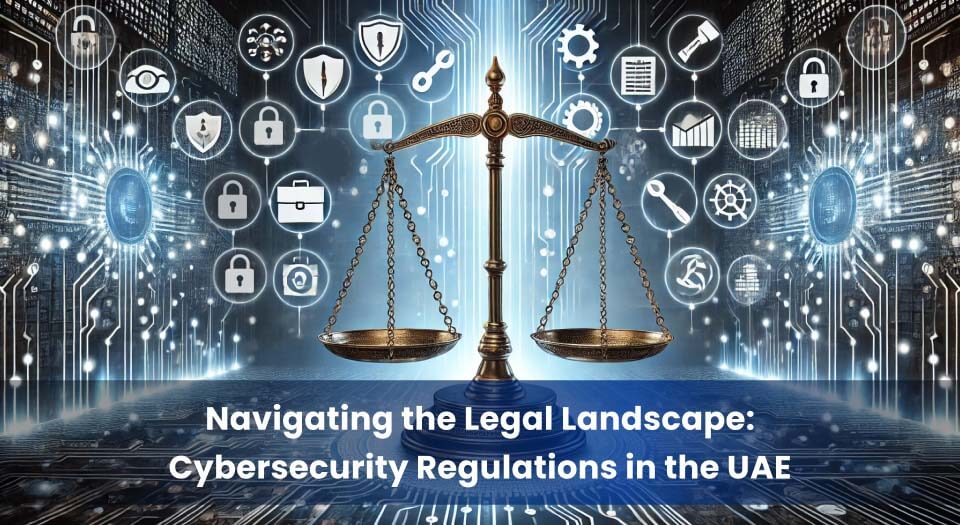
The UAE has established a strong legal framework to address cybersecurity risks, including ransomware attacks. Key regulations, such as the UAE Cybercrime Law (Federal Decree-Law No. 5 of 2012) and the National Cybersecurity Strategy introduced by the Telecommunications and Digital Government Regulatory Authority (TDRA), outline measures that businesses must follow to safeguard their digital infrastructure. These laws emphasize the protection of personal and business data, holding companies accountable for breaches or mishandling of sensitive information.
Compliance with these regulations plays a crucial role in mitigating ransomware risks for businesses operating in the UAE. By adhering to legal requirements for data protection, incident reporting, and proactive cybersecurity measures, companies can reduce their vulnerability to attacks. For example, the National Cybersecurity Strategy mandates organizations to conduct regular cybersecurity assessments and implement strong defenses, such as multi-factor authentication and data encryption, which help protect against ransomware threats.
Failure to comply with these laws can result in significant penalties, including fines and reputational damage, further underlining the importance of staying aligned with legal standards. Businesses, particularly SMEs, should regularly consult UAE government resources, such as the Telecommunications and Digital Government Regulatory Authority (TDRA) website, to stay informed about the latest cybersecurity guidelines and ensure compliance with national regulations. By doing so, companies can better manage cybersecurity risks, including ransomware, and protect their operations from both legal and financial repercussions.
For more detailed information on UAE cybersecurity regulations, you can refer to the UAE Cybercrime Law.
In conclusion, ransomware continues to pose a significant threat to businesses, particularly small and medium-sized enterprises (SMEs) in the UAE. By understanding how ransomware operates, recognizing the critical role the dark web plays in facilitating these attacks, and implementing best practices like regular backups, multi-factor authentication, and network segmentation, businesses can significantly reduce their risk of falling victim to such threats. Conducting a thorough cybersecurity assessment and integrating dark web intelligence into a security gap analysis are essential steps in identifying vulnerabilities before they are exploited.
Proactive measures are crucial in today’s rapidly evolving cybersecurity landscape. Investing in comprehensive cybersecurity solutions and staying informed about the latest ransomware trends can help businesses safeguard their operations, data, and reputation. Whether it’s seeking out cybersecurity services for small businesses or conducting regular risk assessments, taking action now can save your company from devastating financial and operational impacts.
We encourage all businesses to prioritize cybersecurity by partnering with trusted service providers and staying vigilant against emerging threats. To learn more about how your business can enhance its cybersecurity posture, consider consulting cybersecurity experts and performing a detailed security gap analysis. Don’t wait for an attack to take action—protect your business whit Cybernod today.
For more information on how to protect your business from dark web threats and conduct a thorough cybersecurity risk assessment, please visit [Understanding the Dark Web: Safeguarding Your Business in the UAE].
Categorized in:
Comments